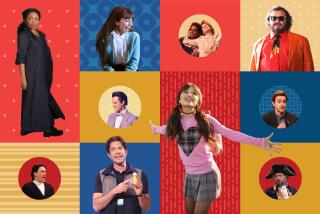Review: ‘Johnny Carson: King of Late Night’ goes behind throne
- Share via
Johnny Carson did not invent late-night television — he wasn’t even the first (or second) host of “The Tonight Show,” which he captained for 30 years until he quit the business cold in 1992 — but he is the most important person ever to have made it his home. His name may mean increasingly little to younger generations, but late-night is still very much the thing he created, shepherded by hosts formed in his image. Any time a talk-show host plays disaster for comedy, building more laughs on the back of a dud joke than he might be getting with a live one, you are watching the shade of Johnny Carson.
It’s 50 years since Carson inherited “The Tonight Show”from Jack Paar, and 20 since he ceded it to Jay Leno, who later temporarily ceded it to Conan O’Brien; in the late-night wars, going back to Leno vs. Letterman, competition for the “Tonight Show” chair was less about the brand or the time slot than it was about the man who most famously occupied it. The truth, Jerry Seinfeld says in Peter Jones’ documentary “Johnny Carson: King of Late Night,” is that “there never was a ‘Tonight Show.’ It was Carson.”
At nearly two hours, the Kevin Spacey-narrated documentary, which premieres Monday as part of the PBS series “American Masters,” covers its notoriously private subject as thoroughly as could be expected. Jones had access to Carson’s own archives, from old home movies to “The Tonight Show” itself, and has called as witnesses an impressive gallery of colleagues, co-workers, comics and friends, including fellow talk-show hosts Dick, Dave, Jay, Conan, Arsenio, Ellen and Jimmy (Fallon, but not Kimmel). Even when, in an attempt to touch every base (some of them repeatedly), the film wanders, it is still good to watch — especially since, as a celebrity in a golden age of photojournalism, Carson was photographed often and well.
Though brief clips give a sense of his style and method, they don’t give the full flavor of his art, which had a slow attack and a long release and was meant to be savored over the course of the 60 (at first, 90) minutes it took to do a “Tonight Show.” He was a host in the truest sense of the word, the person who provides a setting in which his guests can shine — Joan Rivers calls him “the best straight man ever” — and, in a way, “The Tonight Show” was the chronicle of his reactions. Even a funny story, says Conan O’Brien, “would not be half as entertaining as seeing Johnny entertained by these people.” Says Mel Brooks, “He’d be like a little kid just waiting for the next candy cane.”
We see several stars in their first, career-making appearances: Drew Carey fights back tears remembering his; Garry Shandling, who would create the Carson-inspired “The Larry Sanders Show,” calls it “a test ground, a firing range,” and Jay Leno remembers it being like “your first girlfriend. You’re not very good, it’s over very quickly and you just want to do it again.”
If to know Carson was to find him unknowable, there nevertheless seems to be remarkable agreement among observers about who he was off-camera: smart, decent, loyal but also demanding loyalty, a person whose natural shyness was amplified by his Midwest roots and whose ambitions were fueled in part by trying to impress a hard-to-please mother: “That wasn’t funny,” Ruth Carson told a Time reporter who had come to watch her watch his monologue. (It was found after her death that she’d kept a box of clippings that tracked his career; Carson kept the box until his own death from emphysema, in 2005.)
And yet, if he was remote and sometimes troubled in his private life — he was a distant (though also proud) father, a philanderer married four times — and constrained by his fame from a normal public one, he was fully present on TV: genuine, open, spontaneous, playful, curious, generous, qualities all the best talk-show hosts share at least in part. A magician and a musician in his off-hours — a clip of him accompanying himself on guitar on the jazz standard “Here’s That Rainy Day” is a small revelation — he was at home with intellectuals, celebrities, eccentrics and exotic animals.
“Whatever was going on … in America,” says comedian David Steinberg, “eventually showed up sitting across from him at the desk.”
More to Read
The biggest entertainment stories
Get our big stories about Hollywood, film, television, music, arts, culture and more right in your inbox as soon as they publish.
You may occasionally receive promotional content from the Los Angeles Times.











